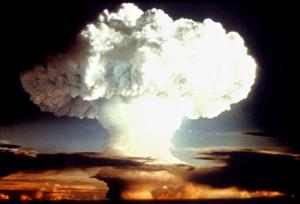Nuclear proliferation U.S. violating nonproliferation agreement: Nuclear experts
More than two dozen nuclear experts, including former U.S. officials under the six preceding presidents of both parties, accused the Obama administration of violating a 2012 nonproliferation agreement to end exports to Europe of bomb-grade, highly enriched uranium (HEU) for production of medical isotopes. The administration proposes to export sixteen pounds of nuclear weapons-grade uranium metal to France to produce medical isotopes in Belgium and the Netherlands.

oncern raised over nuclear weapon proliferation by the U.S. // Source: theconversation.com
More than two dozen nuclear experts, including former U.S. officials under the six preceding presidents of both parties, accused the Obama administration of violating a 2012 nonproliferation agreement to end exports to Europe of bomb-grade, highly enriched uranium (HEU) for production of medical isotopes.
In a letter sent to both the U.S. Department of Energy (DOE) and the U.S. Nuclear Regulatory Commission (NRC), the experts expressed “deep concern” at the administration’s proposed export of sixteen pounds of nuclear weapons-grade uranium metal to France to produce medical isotopes in Belgium and the Netherlands. The letter cites a multilateral agreement reached at the 2012 Nuclear Security Summit, which pledged that “the use of HEU will be completely eliminated for medical isotopes that are produced in Belgium, France, and The Netherlands and used in those countries and in the United States,” and which included a target date for conversion to “non-HEU-based processes by2015.”
The nuclear experts cautioned against continued “use of weapons-grade uranium at civilian facilities in Europe that cannot be protected like military facilities,” and said minimization of such commerce is “essential to preventing nuclear proliferation and nuclear terrorism.”
The Nuclear Proliferation Prevention Program says that the letter warns that the Obama administration, by violating its 2012 commitment, also risks undermining the credibility of other pledges made by dozens of countries at the four nuclear security summits from 2010 to 2016. The experts ask, “If the United States, the originator and leader of the summits, can violate its own commitment, why should other countries feel bound by theirs?”
The letter acknowledges the regulatory hurdles to selling medical isotopes produced without HEU, but notes that these hurdles already have been overcome by companies in Argentina, Australia, and South Africa.
The experts urge the U.S. government to slash the proposed export “to send a clear message that the United States intends to fulfill the spirit of its 2012 pledge,” and to “incentivize” the Europeans to expedite their conversion to production processes that avoid bomb-grade uranium.
The export application from DOE’s National Nuclear Security Administration (NNSA) was published in the Federal Register on 15 August, and a decision will be made by the U.S. Nuclear Regulatory Commission after the end of its public comment period on 14 September.
